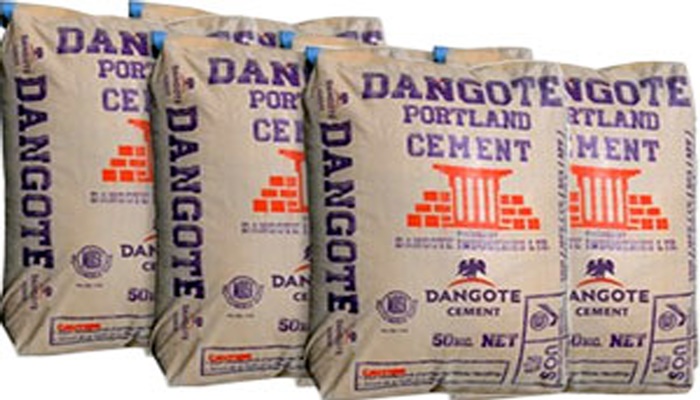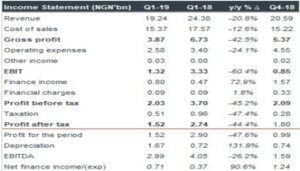
- Investors react negatively on NSE
Friday last week, Dangote Cement Plc released to The Nigerian Stock Exchange (NSE) its unaudited first quarter results for the period ended March 31, 2019. The result which fell short of the market expectation shows huge declined of profit before tax (PBT) of 27.2 per cent to N78.96 billion in the period under review.
The company also reported a revenue drop of -0.8 per cent to N240.15 billion as against N242.11billion recorded in the previous quarter even as its profit after tax (PAT( declined by 16.5 per cent to N60.25 billion.
Expectedly, the market reacted negatively to the result as company stock was one of the major decliner on the Nigerian Stock Exchange on Monday, the first trading day after the result was released to the market. It dropped by 90k to close at N186 per share.
Contraction of its revenue earnings by 16.5 per cent year-on-year to N60.3 billion is largely due to elevated operating expenses +27.6 per cent year-on-year and a net finance cost of N9.4 billion booked during the period as against net finance income of N4.6 billion recorded in the same quarter of 2018.
Also, the Group revenue was slightly lower at-0.8 per cent year-on-year to N240.2 billion, as weakness in the Nigerian business at-2.3 per cent year-on-year to N169.9 billion which offset the 2.5 per cent year-on-year increase in Pan African revenue to N70.3 billion.
Further analysis of the result shows that in Nigeria, top-line contraction was driven by lower average prices -2.9 per cent to N42,567/tonne, amidst largely flat volumes at +0.6 per cent year-on-year to 4.0Mt; Nigeria: +7.1 per cent year-on-year to 6.0Mt).
By our estimate, DANGCEM’s market share declined to 66.5% in Q1’19 (vs. 70.9% in Q1’18). We believe the loss in market share likely reflects BUA’s growing presence across regions such as the North West and South South.
Earnings before interest, tax, depreciation and amortization (EBITDA) margin also declined to 46.5 per cent in Q1’19 from 52.0 per cent in Q1’18, reflecting higher haulage costs (+32.8% YoY), general increase in the prices of raw materials, higher labour costs, and weaker cement prices in Nigeria.
Although management attributed the weaker Nigerian performance to election related slowdown in cement consumption. Notwithstanding, investors are expected to continue to react negatively to the result.






